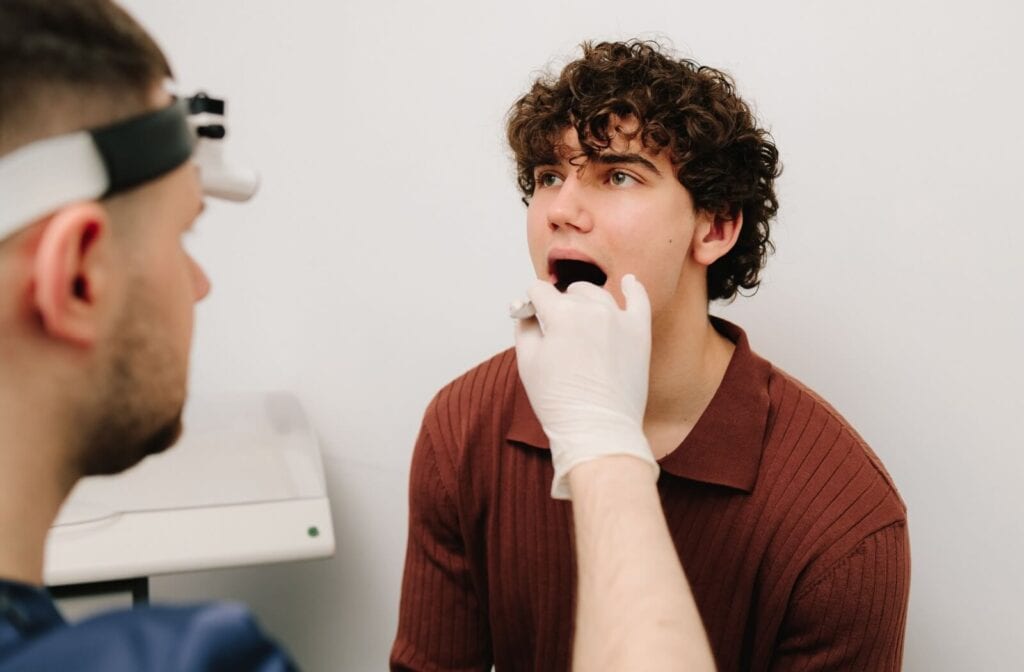Can a Dentist Remove Tonsil Stones?
Ever feel like there’s a little something stuck in your throat that just will not budge? You might be dealing with tonsil stones, those pesky, calcified bits that hide in your tonsils. They are small, but they can pack a punch when it comes to causing bad breath and throat irritation. While at-home tricks might help, some tonsil stones are too stubborn to tackle on your own.
That is where your dentist comes in. At South Ancaster Family Dental, we can safely remove tonsil stones and help prevent them from coming back. Regular dental cleanings can also keep bacteria at bay, making it harder for these annoying little stones to form.
If tonsil stones are making life uncomfortable, a quick dental visit could be the fresh start you need.
What Are Tonsil Stones?
Tonsil stones, also known as tonsilloliths, are hard, calcified deposits of debris that form in the crevices of the tonsils, known as tonsillar crypts. Your tonsils play an important role in fighting infections by trapping bacteria, viruses, and other particles.
However, for some people, this trapped material—including mucus, dead cells, and food particles—can harden and form stones over time.
Symptoms of Tonsil Stones
- Persistent bad breath, also known as halitosis
- A metallic or unpleasant taste in the mouth
- Difficulty swallowing or a sensation of something being stuck in the throat
- Visible white or yellowish deposits on the tonsils
- Ear or throat discomfort in more severe cases
While small tonsil stones may not present any symptoms, larger or multiple stones can cause noticeable discomfort.
Can a Dentist Remove Tonsil Stones?
Yes, dentists can remove tonsil stones in many cases. Dentists are trained professionals equipped with the knowledge and tools to address various oral health concerns, including issues that involve or affect the tonsils.
Tonsil stones may not always fall under a dentist’s typical scope of practice, as they are more closely related to the throat than the teeth. However, many general dentists and oral health practitioners can assist with their removal during a consultation, particularly if the stones are visible and accessible.
How Do Dentists Treat Tonsil Stones?
Dentists use several techniques to remove tonsil stones, depending on their size, location, and the tools available. Here are some of the common methods:
Manual Removal
Using specialized sterile tools, such as a dental pick or curette, a dentist can gently dislodge and extract visible tonsil stones. This method is effective when the stones are near the surface of the tonsils but may not be suitable for deeper, less accessible stones.
Flushing or Irrigation
To remove smaller particles or loosen stones, dentists may use water or saline irrigation systems. These systems apply targeted pressure to the tonsils to flush out debris without damaging the surrounding tissues. Irrigation is often painless and minimally invasive.
Laser Cryptolysis
Some dentists are equipped with advanced tools like lasers, which can treat the crypts of the tonsils where stones typically form. The laser can smooth the crypts’ surfaces, making it less likely for debris to accumulate and form tonsil stones. This technique is generally reserved for recurrent or severe cases.
Referral to a Specialist
If the tonsil stones are particularly large, deeply embedded, or causing severe symptoms, your dentist may refer you to an ear, nose, and throat (ENT) specialist for further evaluation and treatment.
When Should You See a Dentist for Tonsil Stones?
While some people successfully remove tonsil stones at home, professional care is beneficial in several scenarios:
- Persistent symptoms: If you are experiencing ongoing discomfort, bad breath, or difficulty swallowing, consulting a dentist can help alleviate these symptoms.
- Recurrent stones: For people with frequent tonsil stones, a dentist can provide a thorough evaluation and suggest preventive measures to address the underlying causes.
- Suspected infection: If the tonsil stones are accompanied by redness, swelling, or fever, it may indicate an infection that requires immediate attention.
- Large or hard-to-reach stones: If the stones are deeply embedded or located in areas that are difficult to access safely, professional intervention is recommended.
Can You Prevent Tonsil Stones?
Preventing tonsil stones often centres around maintaining proper oral hygiene and reducing the buildup of debris in the mouth. The following tips can help:
- Brush your teeth at least twice a day to remove food particles and bacteria.
- Floss daily to clean areas between the teeth where debris can accumulate.
- Use an antibacterial mouthwash to reduce bacteria in the oral cavity.
- Stay hydrated to help wash away debris from the throat and tonsils.
- Regularly clean your tongue, as bacteria and debris can collect there.
- Avoid smoking and reduce alcohol intake, both of which can contribute to dry mouth and increased risk of tonsil stones.
For people prone to recurring tonsil stones, your dentist may recommend targeted strategies, such as using a water flosser to flush the tonsillar crypts.
Ready to Say Goodbye to Tonsil Stones?
Tonsil stones are manageable, and dentists play a vital role in providing relief and expert guidance. Whether you need help with removal, prevention strategies, or specialist referrals, a dental professional can address your concerns effectively.If you are experiencing tonsil stones or related symptoms, schedule an appointment with South Ancaster Family Dental today. Our experienced team is here to help you maintain your oral health and enjoy a better quality of life.

